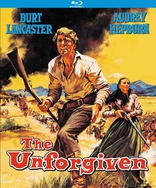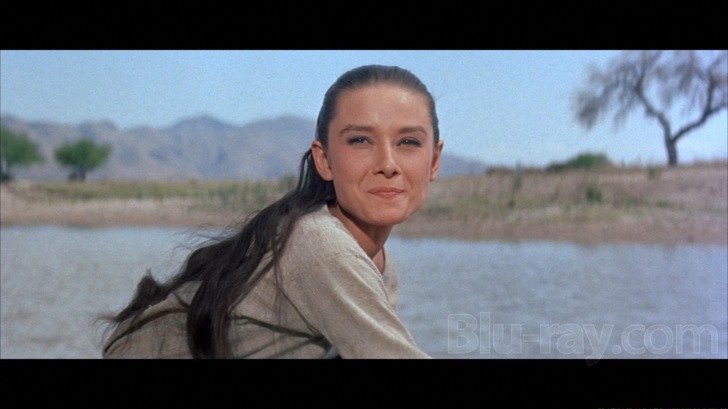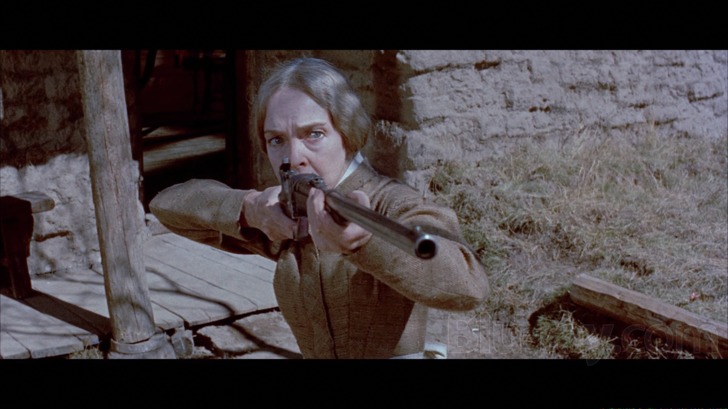The Unforgiven Blu-ray Movie
HomeThe Unforgiven Blu-ray Movie 
Kino Lorber | 1960 | 125 min | Rated PG | Aug 12, 2014
Movie rating
7 | / 10 |
Blu-ray rating
| Users | 0.0 | |
| Reviewer | 3.0 | |
| Overall | 3.0 |
Overview
The Unforgiven (1960)
In 1850s, a cattling raising Texas family is turned upside down when it is revealed that one of their women is of Native American blood.
Starring: Burt Lancaster, Audrey Hepburn, Audie Murphy, John Saxon, Lillian GishDirector: John Huston
| Western | Uncertain |
| Romance | Uncertain |
| Drama | Uncertain |
Specifications
Video
Video codec: MPEG-4 AVC
Video resolution: 1080p
Aspect ratio: 2.35:1
Original aspect ratio: 2.35:1
Audio
English: DTS-HD Master Audio 2.0
Subtitles
English
Discs
25GB Blu-ray Disc
Single disc (1 BD)
Playback
Region A (C untested)
Review
Rating summary
| Movie | 3.0 | |
| Video | 3.5 | |
| Audio | 3.5 | |
| Extras | 0.5 | |
| Overall | 3.0 |
The Unforgiven Blu-ray Movie Review
The Finders.
Reviewed by Jeffrey Kauffman August 11, 2014Is The Unforgiven the bastard stepchild of The Searchers ? Both films are based on novels by Alan LeMay, and both deal rather viscerally with young women who have been taken from their natural birth surroundings, thereby opening up compelling examinations of racism in the Old West. In the case of The Searchers, a white girl (played by Natalie Wood) is abducted by Indians (as Native Americans were inevitably referred to back then), while in The Unforgiven, a Native American girl is raised as white. Both films are rather remarkable testaments to moral shades of gray, with both white settlers and Native Americans portrayed with a full gamut of motivations and both honorable and indefensible behaviors. Rather oddly, both films also feature the appearance of a Civil War veteran which helps to set the story into motion. However, despite several other similarities, the two films are accorded radically different places not just in general film history, but in the filmographies of their iconic directors. The Searchers is regularly ranked at or near the top of John Ford’s oeuvre, while The Unforgiven is seen as one of the more problematic efforts by John Huston (not so coincidentally by Huston himself).

The Zachary family homestead has managed to carve out a bit of civilization in the wilds of 19th century Texas—if only barely, as evidenced by cattle feeding off the sod roof of their mud wattle cabin. Daughter Rachel Zachary (Audrey Hepburn) seems to have a special commune with nature, relishing in the flight of geese overhead and having heart to heart chats with a beautiful white horse she’s attempting to tame. While out riding this horse one day, she’s frightened by the almost magical appearance of a dusty Civil War vet (still in uniform), a man who seems to know a lot about Rachel and the Zachary clan and who tells Rachel she’s not actually a Zachary. This comes as no surprise to the girl, who readily admits she was a “foundling”, a baby that the Zacharys kindly took in as their own when her birth parents were killed by the savage Kiowa tribe.
Rachel’s mother Mattilda (Lillian Gish) tells her adopted daughter to forget about the interchange, that the crazed man was obviously suffering from so-called “prairie fever”. However, when the man shows up at the Zachary cabin a few minutes later, Mattilda shoos Rachel into the root cellar and confronts the man, making it clear she knows exactly who he is. His name is Abe Kelsey (Joseph Wiseman), and it’s completely obvious he has some kind of convoluted history with the Zacharys. Though Mattilda aims her rifle at him and seems poised to shoot him dead right there, Abe, a rather biblical character from the get go, manages to threaten the woman with Divine wrath, causing her to hesitantly put her firearm down.
Soon enough three Zachary siblings return from various activities. Ben (Burt Lancaster), the eldest, has been away to the “big city” of Wichita, while younger brothers Cash (Audie Murphy) and Andy (Doug McClure), have been dealing with the Zachary’s large herd of cattle, part of which they share with their neighbor Zeb Rawlins (Charles Bickford). Zeb’s son Charlie (Albert Salmi) has eyes for Rachel, while the Rawlins daughter, Georgia (Kipp Hamilton), is comically desperate to land Cash as a husband. While this would seem to be a near picture perfect intermingling of two prairie families, there are frayed threads dangling from what initially appears to be close knit relationships. Cash really doesn’t want to have anything to do with Georgia (at least the way Georgia does), and Ben seems preternaturally interested in Rachel, an interest perhaps generated by his knowledge that Rachel is not really his sister.
A series of cascading events soon puts everything the Zacharys think they knew about their lives and their place in Texas society in jeopardy. When the Kiowa turn up demanding the return of a woman taken long ago from them when she was but a babe, Ben reacts viscerally, telling them they’re out of their minds. Later, though, the Kiowa kill one of the major supporting characters, which in turn leads to a series of revelations where the doubts of Ben and his siblings about Rachel’s heritage are confirmed—Rachel is indeed a Native American, a member of the Kiowa tribe. When Abe is rounded up by a posse, he divulges the entire convoluted history that not only intertwined his family with the Zachary clan, but which also led to Rachel’s “appropriation” as a supposed white child.
What’s facinating about The Unforgiven is how virtually no major character makes it out of the film unscathed. Several major characters indeed are dead by the end of the film, but perhaps even more importantly, there’s emotional devastation running rampant throughout this film which affects virtually everyone in it. To cite just one example, Mattilda seems to be a completely sympathetic character, a woman whose adoption of Rachel appears wholly noble. And yet when she’s confronted with the truth of what actually happened, Mattilda doesn’t hesitate to take matters into her own hands, completing the lynching of Abe that her neighbors haven’t quite had the courage to bring to a conclusion.
The Freudian and other psychological elements in The Unforgiven can give armchair analysts a field day. Rachel flirts with Charlie in order to incite jealousy in Ben. Ben obviously has desires for Rachel, but can’t quite bring himself to romance his “sister”. Mattilda attempts to plaster over the peccadilloes of the past with an equal amount of denial and moral indignation. Racism is just a fact of life in this film, so much so that (unbelievable as it may sound) the “n” word is bandied about with almost shocking regularity, albeit with the modifier “red” in front of it. While Ben and Rachel may be the most unsullied characters here, even they exist in a world of emotional imbalance and psychological frailty.
There’s an oddly florid ambience to much of The Unforgiven which is somewhat reminiscent of similarly hyperbolic elements in the admittedly quite different Johnny Guitar. Weirdly, despite their obvious dissimilarities, both films feature resolute females pounding away on a keyboard while catastrophe approaches. Huston perhaps even ups the ante from Nicholas Ray by having his extemporaneous concert take place outside. While Johnny Guitar often plays like a fever dream, The Unforgiven unfolds as more of a waking nightmare, where characters aren’t quite who they think they are and seemingly comfortable relationships dissolve unexpectedly. Like most nightmares, there’s a certain amount of relief once you’ve awoken, but a lingering sense that no true happy endings are possible.
The Unforgiven Blu-ray Movie, Video Quality 

The Unforgiven is presented on Blu-ray courtesy of Kino Lorber Studio Classics with an AVC encoded 1080p transfer in 2.35:1. The elements here are in fairly good condition, though there are recurrent issues with scratches and so-called "minus density" and other brief moments of damage. Color has faded slightly, lending a brown tint to much of the transfer, something that's especially evident in flesh tones. There's also somewhat variable sharpness and especially color saturation (compare, for example, screenshots 1 and 4). Close-ups still provide very good fine detail and many of the wide open prairie scenes offer great depth of field. Grain structure is intact and organic looking. Still, this is a somewhat soft looking presentation that stutters occasionally with anomalies like judder in panning shots. Optical dissolves also look strangely shoddy throughout the film. Large swaths of The Unforgiven look quite good, so good in fact that some may feel a 4.0 score is more appropriate. The inconsistencies here have led me to slightly downgrade the score so that fans are forewarned and forearmed.
The Unforgiven Blu-ray Movie, Audio Quality 

Fans of The Unforgiven have long lamented the really horrible sounding underscore by Dmitri Tiomkin, a score the legendary composer recorded in Italy and which has always sounded like it's being ported in from Italy via a not very good transistor radio. Unfortunately this new Blu-ray's lossless DTS-HD Master Audio 2.0 mono mix does nothing to ameliorate this longstanding issue, and in fact the lossless environment only points out that this is sadly one of Tiomkin's less successful scores. The music issue aside, dialogue comes through quite well, and sound effects like thundering cattle, gunfights and the like all sound decently full bodied.
The Unforgiven Blu-ray Movie, Special Features and Extras 

- Trailer (1080p; 4:31)
The Unforgiven Blu-ray Movie, Overall Score and Recommendation 

The Unforgiven has a lot of fascinating elements (maybe too many, frankly), but it just doesn't quite gel, at least not in the same way that The Searchers does, as several people associated with the film (including John Huston) seem to have realized. Still, this is often a viscerally compelling examination of racism in the (very) wild west, and it contains some standout performances by Lillian Gish and (perhaps unexpectedly) Audie Murphy. Hepburn is perhaps a bit too patrician to be playing this character, but she brings a lovely vulnerability to Rachel's plight. Technical merits here are somewhat problematic, but with caveats noted, The Unforgiven comes Recommended.
Similar titles
Similar titles you might also like

Cimarron
Warner Archive Collection
1960

Horizon: An American Saga - Chapter 1
2024

The Duel
2016

She Wore a Yellow Ribbon
Warner Archive Collection
1949

The Ballad of Little Jo
1993

Broken Lance
Limited Edition to 3000
1954

Rio Grande
1950

Duel in the Sun
Roadshow Edition
1946

Devil's Doorway
Warner Archive Collection
1950

The Tall Men
Limited Edition to 3000
1955

Rio Bravo
1959

Will Penny
1968

The Last Hunt
1956

Jane Got a Gun
2015

Blood on the Moon
Warner Archive Collection
1948

Forsaken
2015

Invitation to a Gunfighter
1964

The Homesman
2014

The Lonely Trail
1936

The Great Northfield Minnesota Raid
1972